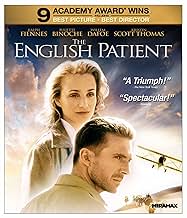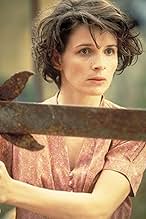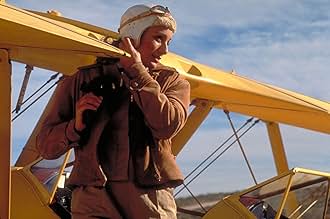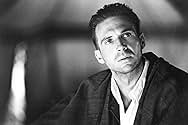À la fin de la Seconde Guerre mondiale, une jeune infirmière s'attache à la victime d'un accident d'avion, grièvement brûlé, et dont le passé, raconté en flash-backs, recèle une histoire d'a... Tout lireÀ la fin de la Seconde Guerre mondiale, une jeune infirmière s'attache à la victime d'un accident d'avion, grièvement brûlé, et dont le passé, raconté en flash-backs, recèle une histoire d'amour fatale.À la fin de la Seconde Guerre mondiale, une jeune infirmière s'attache à la victime d'un accident d'avion, grièvement brûlé, et dont le passé, raconté en flash-backs, recèle une histoire d'amour fatale.
- Réalisation
- Scénario
- Casting principal
- Récompensé par 9 Oscars
- 62 victoires et 78 nominations au total
Avis à la une
During the war, a man (Ralph Fiennes) is discovered in the burning remnants of a crashed plane. With his face scarred beyond recognition, and with the man seemingly suffering from amnesia, he is assumed to be an Allied soldier, and is simply referred to as "the English patient." After the war, in the mine-ridden hills of Italy, a kind nurse, Hana (Juliette Binoche), who has apparently lost everybody close to her, remains in a ruined monastery to look after the dying man. Over time, she comes to learn more and more about her "English patient," who is actually revealed to be a Hungarian geographer, Count Laszlo de Almásy. Rather than losing his memory in the plane crash, we learn that this scar-ridden man has perhaps chosen to forget his past, both to protect himself from persecution and to cure himself of the tragic memories of his past love. Via numerous flashbacks, we learn of Almásy's former exploits in the Sahara desert, and his romantic liaison with a married woman, Katharine Clifton (Kristin Scott Thomas).
It's certainly easy to see why 'The English Patient' was so successful at the Oscars. It is such a beautiful film, blending the quiet beauty of the Italian countryside with the endless golden sands of the desert. Cinematographer John Seale captures the landscape to perfection; not since David Lean's magnificent 'Lawrence of Arabia' has a film shown the desert with such beauty and grandeur, making particularly good use of sweeping aerial shots from Almásy's plane. Even in the film's more intimate moments, excellent use of close-ups and lighting capture the emotion of the scene, coupled, of course, with the brilliant performances from all the cast members.
A long-time favourite actor of mine, 'The English Patient' might just contain Ralph Fiennes' finest performance, and, considering his history includes such films as 'Schindler's List' and 'The Constant Gardener,' this is not a complement that is to be taken lightly. His Count Laszlo de Almásy is initially a very sympathetic character, but, as we slowly learn more about his past, his likable qualities are eroded by his less-admirable tendencies towards others. "Ownership" is a major theme of the film. When asked by Katherine what he hates most, Almásy replies with "Ownership. Being owned. When you leave you should forget me." However, as the relationship progresses, and Katherine perhaps tries to distance herself from him, Almásy reveals a hint of arrogance, insisting that his love for her somehow entitles him to have her whenever he likes: "I want to touch you. I want the things which are mine, which belong to me."
Juliette Binoche, who received an Oscar for her performance here, is excellent as Hana, the lonesome nurse who fears to love because of the tragedies that have always harmed those close to her. After some time of caring for Almásy alone, she is joined by a dubious Canadian thief, David Caravaggio (Willem Dafoe), who lost his thumbs during the war, and who suspects that it was Almásy who betrayed him to the Germans. Hana also strikes up a tentative romantic relationship with Kip (Naveen Andrews), an Indian bomb-diffuser in the British Army. However, due to her past history, Hana is afraid that becoming involved with Kip will doom him to death, particularly considering his very dangerous line of work.
At 160 minutes in length, 'The English Patient' wonderfully evokes memories of the classic romantic epics of old, successfully finding a balance of mystery, love, joy and tragedy. The ending of the film is heartbreaking and sorrowful, but also uplifting in its own way. Whilst some romantic relationships are doomed from the very beginning, others have a very good chance of bringing happiness. Nevertheless, in every case, it is always better to have loved and lost, than never to have loved at all.
This is quite a modern epic. It has the running time of an epic, it has the gorgeous cinematography of an epic, it has the acting of an epic and it has a story of love (lust) against the backdrop of major events in history. Even though it changes or leaves out a significant amount of the original novel it still manages to be a great mix of passionate desire and mystery. The mystery of the story is represented by the thief Caravaggio who casts light on what he knows of de Almásy's past (as he sees it) while the love story is unfolded as it develops in a passionate affair between him and Katherine, a colleagues' wife. The story is compelling enough to carry the long running time, at times the pace seems a little slow and when I saw it in my local multiplex there were some moments where large portions of the audience seemed to be shifting in their seats.
The love' of the story was interesting as it seems to be contrasted with Hana's relationship with Kip the bomb disposal expert. While de Almásy's relationship with Katherine starts as lust and desire before growing into what seems to be love (or could be grief at the result of their affair), Hana's is portrayed as purer and more careful as she fears those she loves will die. This difference helped me see that the film did want to show the destructive power of lust and affairs, however the fact that the central relationship was based more on lust than love took away from the emotional core of the story.
The acting is almost impeccable. Fiennes is excellent even when he is lost behind an unrecognisable mask of burnt flesh. Thomas is actually very good, I find she tends to be very wooden in some things but this type of very English character brings the best out of her. Binoche is excellent as Hana and carries the heart of the film. Dafoe is truly excellent - his element of the story is the mystery and he does it well. He is a great actor and deserves to be in things this good. The support cast include plenty of good actors including Colin Firth, Jurgen Prochnow and Naveem Andrews.
The film is beautifully shot - even though it's all a bit too picturesque to be real! However the director can handle himself well with many different scenes - a tense bomb diffusal, a passionate love scene, a dangerous sand storm etc. Overall the slow pace may frustrate some younger audiences but this is a really good film that draws it's values from classy sources.
I'm sure many of those who hated it are much like a co-worker of mine who said "Books? I haven't a book since I had to in high school." I checked some of the names of the people who reviled this movie and sure enough it seems many of them think Armaggedon was an "awesome" movie and Chris Farley was a "Comic genius". And that's O.K. Taste is an individual thing.
My sensibilities tell me that the english patient is a very good movie that takes effort to appreciate. Much in this movie is very subtle. It is not a vacation for the brain.(Hey, sometimes the brain NEEDS a vacation, and stupid movies provide that!) Also, it is not a cynic's movie. It's about idealism, tragedy and regret. About how people can want the best but have it all fall apart because of bad choices, and have to go on with the regret of never being able to remedy the situation. Not so much a love story as a tragic one. So many people destroyed because of the selfishness of two people couldn't(wouldn't?) control themselves.
I would ask those who thought the movie boring to watch it again when you feel able to pay full attention to what's going on in the film and how different bits of dialogue dovetail into subtle suggestions of how the characters are feeling and thinking. This movie takes an investment of time, thought and emotion. If this investment is made, I think most people who watch it will feel rewarded.
I always appreciated this movie, although the genre is not my typical style (I never watched Titanic for instance, and am not planning to).
The English Patient grips because it shows how people can be different when they are in an exotic environment as opposed when they are 'home' (Katherine), it shows how destructive love can be in a slow, strong and utterly painful way, it excites because of the extremely passionate affair, the pain of the one(s) who leave behind, how pointless one can feel to move on.
The photography is just stunning, not to mention the play of the actors. The pace is slow, but timely, and that does justice to the book, the timeline, and the depth/development of the characters. To put this in 110 minutes (as some seem to suggest here) would amputate the multi-layeredness of this movie. People tend to have difficulties with the pace of movies... as if they are in a rush to get to work.. hey - get a life ! ;-) enjoy...
I give this movie 4.5 out of 5.
Oscars Best Picture Winners, Ranked
Oscars Best Picture Winners, Ranked
Le saviez-vous
- AnecdotesThe Germans who shoot at Almásy's plane at the beginning were actually tourists roped into the production because they couldn't afford any more extras.
- GaffesKatharine Clifton (Scott-Thomas) explains to Count László Almásy (Fiennes), that her husband is map making in Ethiopia. The year at this point is 1939, and the country was known as Abyssinia until 1945.
- Citations
Katharine Clifton: My darling. I'm waiting for you. How long is the day in the dark? Or a week? The fire is gone, and I'm horribly cold. I really should drag myself outside but then there'd be the sun. I'm afraid I waste the light on the paintings, not writing these words. We die. We die rich with lovers and tribes, tastes we have swallowed, bodies we've entered and swum up like rivers. Fears we've hidden in - like this wretched cave. I want all this marked on my body. We are the real countries. Not boundaries drawn on maps with the names of powerful men. I know you'll come carry me out to the Palace of Winds. That's what I've wanted: to walk in such a place with you. With friends, on an earth without maps. The lamp has gone out and I'm writing in the darkness.
- Crédits fousDisclaimer in end credits: "While a number of the characters who appear in this film are based on historical figures, and while many of the areas described - such as the Cave of Swimmers and its surrounding desert - exist and were explored in the 1930s, it is important to stress that this story is a fiction and that the portraits of the characters who appear in it are fictional, as are some of the events and journeys."
- Bandes originalesYes! We Have No Bananas
Words and Music by Frank Silver and Irving Cohn (as Irving Conn)
Published by Skidmore Music Co., Inc.
Meilleurs choix
Détails
- Date de sortie
- Pays d’origine
- Sites officiels
- Langues
- Aussi connu sous le nom de
- El paciente inglés
- Lieux de tournage
- Sociétés de production
- Voir plus de crédits d'entreprise sur IMDbPro
Box-office
- Budget
- 27 000 000 $US (estimé)
- Montant brut aux États-Unis et au Canada
- 78 676 425 $US
- Week-end de sortie aux États-Unis et au Canada
- 278 439 $US
- 17 nov. 1996
- Montant brut mondial
- 231 976 425 $US
- Durée2 heures 42 minutes
- Couleur
- Mixage
- Rapport de forme
- 1.85 : 1








































